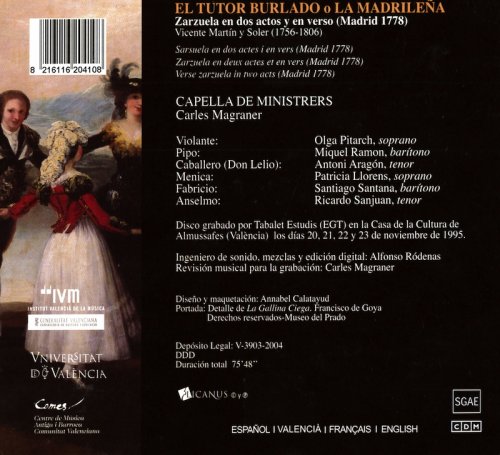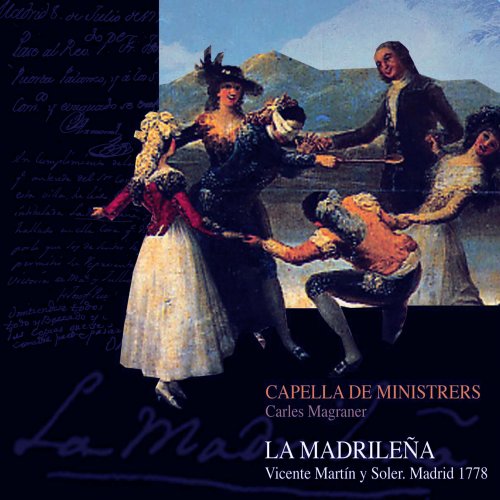
Capella De Ministrers, Carles Magraner - La Madrileña (2004)
BAND/ARTIST: Capella De Ministrers, Carles Magraner
- Title: La Madrileña
- Year Of Release: 2004
- Label: CDM
- Genre: Classical
- Quality: flac lossless (tracks)
- Total Time: 01:15:09
- Total Size: 367 mb
- WebSite: Album Preview
Tracklist
01. Obertura
02. Ya Amanece Si Os Parece
03. A Mi ídolo Direis
04. Doncellitas Inocentes
05. La Primera Mujer Que Amé en el Mundo
06. Por Piedad Te Doy la Mano
07. Con un Señor Abate
08. Ponte Violante Así y Atenta Mírame
09. Dime Inconstante Traidora
10. Mi Abuela Bien Decía
11. No Se Si Mi Esperanza
12. Entra Ya Presto
13. Caracoles
14. Dónde Se Hallará
15. El Que los Mira Admira
16. Me Hallo Perdida
17. Ya Segura la Tenemos
18. Inocentita y Niña
19. Ay Que Desgracia
20. Esta Es Mi Mano
21. Tu Me Quieres, Yo Te Adoro

In 1996 Carles Magraner and Capella de Ministrers recorded a zarzuela by Vicente Martín y Soler, La Madrileña, and we are presenting here the re-edition from 2004. This recording of the version presented in Madrid in 1778 is one of the milestones in the recovery of the works of the Valencian composer, whose prominence in 18th century Vienna once overshadowed that of Mozart.
The Valencian theatrical life between the years 65 and 75 of the XVIII century was of apogee. This is justified if we observe the number of operas represented, the edited musical writings and the diversity of their authors, most of them Italians (Francesco di Maio, Nicolo Piccinni, Baltasar Gallupi, Pietro Guglielmi, Tomás Trajetta, David Pérez, among others ). Among the musicians who visited the city of Turia in this decade we highlight Luigi Bocherini who, in November of 1768, and recently arrived in Spain with what would be his future wife Clementina Pellicia, played an aria composed by him in the opera di Majo L'Almeria. The restoration of the theatrical shows in the city of Valencia was done progressively, giving us a brief idea of the musical life that breathed and influenced Martin and Soler in his youth and during the period between 1765 and 1775, year in which that he opens in Madrid Il tutore burlato supposing him already resident in the capital of Spain. Although in more than one dictionary, I due avari is cited as the first opera that the Valencian Vicente Martín y Soler composed and premiered, until now the libretto and the score have not appeared. In its place it is, duly cataloged by the name of its author. Il tutore burlato, opera buffa in three acts, of 1775, which is in the background of music of the Municipal Historical Library of Madrid (BHM Mus 189-6). In none of the sources in which this work is included, it warns a very special characteristic, since, it is necessary to examine it to discover that in addition to an opera in Italian, it is also a zarzuela with text in spanish. It is the only work of Martín y Soler sung on the stage of the Court, with this particularity. Everything said above allows us to think that the mocked tutor, intelligently renamed La Madrileña, could well be one of the adaptations Esteve made for theater commercial of the time. This type of transformation and in particular that of the tutor does not pretend to be an example of literary fidelity, but, rather, a reflection of the theatrical practice.
01. Obertura
02. Ya Amanece Si Os Parece
03. A Mi ídolo Direis
04. Doncellitas Inocentes
05. La Primera Mujer Que Amé en el Mundo
06. Por Piedad Te Doy la Mano
07. Con un Señor Abate
08. Ponte Violante Así y Atenta Mírame
09. Dime Inconstante Traidora
10. Mi Abuela Bien Decía
11. No Se Si Mi Esperanza
12. Entra Ya Presto
13. Caracoles
14. Dónde Se Hallará
15. El Que los Mira Admira
16. Me Hallo Perdida
17. Ya Segura la Tenemos
18. Inocentita y Niña
19. Ay Que Desgracia
20. Esta Es Mi Mano
21. Tu Me Quieres, Yo Te Adoro

In 1996 Carles Magraner and Capella de Ministrers recorded a zarzuela by Vicente Martín y Soler, La Madrileña, and we are presenting here the re-edition from 2004. This recording of the version presented in Madrid in 1778 is one of the milestones in the recovery of the works of the Valencian composer, whose prominence in 18th century Vienna once overshadowed that of Mozart.
The Valencian theatrical life between the years 65 and 75 of the XVIII century was of apogee. This is justified if we observe the number of operas represented, the edited musical writings and the diversity of their authors, most of them Italians (Francesco di Maio, Nicolo Piccinni, Baltasar Gallupi, Pietro Guglielmi, Tomás Trajetta, David Pérez, among others ). Among the musicians who visited the city of Turia in this decade we highlight Luigi Bocherini who, in November of 1768, and recently arrived in Spain with what would be his future wife Clementina Pellicia, played an aria composed by him in the opera di Majo L'Almeria. The restoration of the theatrical shows in the city of Valencia was done progressively, giving us a brief idea of the musical life that breathed and influenced Martin and Soler in his youth and during the period between 1765 and 1775, year in which that he opens in Madrid Il tutore burlato supposing him already resident in the capital of Spain. Although in more than one dictionary, I due avari is cited as the first opera that the Valencian Vicente Martín y Soler composed and premiered, until now the libretto and the score have not appeared. In its place it is, duly cataloged by the name of its author. Il tutore burlato, opera buffa in three acts, of 1775, which is in the background of music of the Municipal Historical Library of Madrid (BHM Mus 189-6). In none of the sources in which this work is included, it warns a very special characteristic, since, it is necessary to examine it to discover that in addition to an opera in Italian, it is also a zarzuela with text in spanish. It is the only work of Martín y Soler sung on the stage of the Court, with this particularity. Everything said above allows us to think that the mocked tutor, intelligently renamed La Madrileña, could well be one of the adaptations Esteve made for theater commercial of the time. This type of transformation and in particular that of the tutor does not pretend to be an example of literary fidelity, but, rather, a reflection of the theatrical practice.
As a ISRA.CLOUD's PREMIUM member you will have the following benefits:
- Unlimited high speed downloads
- Download directly without waiting time
- Unlimited parallel downloads
- Support for download accelerators
- No advertising
- Resume broken downloads


